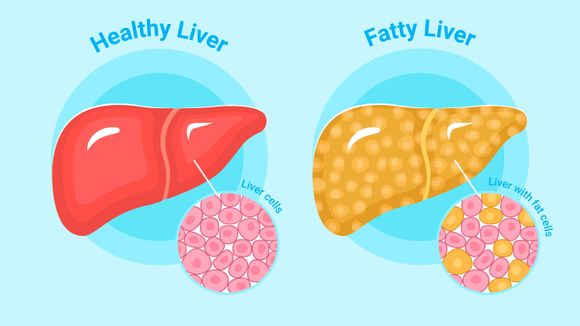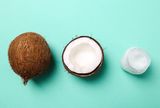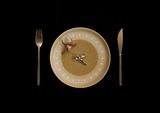What is fatty liver disease?
Fatty liver (steatosis) is a common condition caused by the accumulation of too much fat in this organ. A healthy liver contains a small amount of fat. This amount becomes problematic when fat reaches 5% to 10% of the liver's weight.
Why is fatty liver disease bad for health?
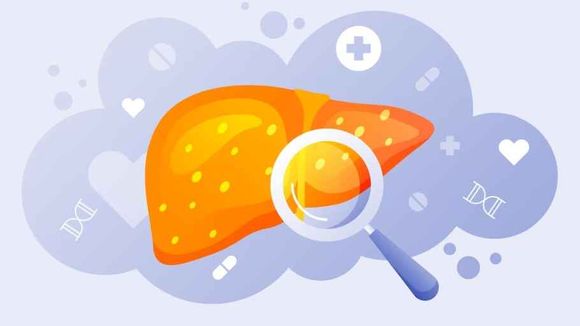
In most cases, fatty liver disease does not cause serious problems and does not prevent the liver from functioning normally. But for approximately 7% to 30% of people with the disease, fatty liver disease gets worse over time. The disease proceeds in three stages:
- Steatohepatitis: The liver becomes inflamed, which damages its tissue. This stage is called steatohepatitis.
- Fibrosis: The scar forms where the liver is already damaged. This process is called fibrosis.
- Cirrhosis: Extensive scar tissue replaces healthy tissue. Then there is cirrhosis of the liver.
What are the types of fatty liver disease?
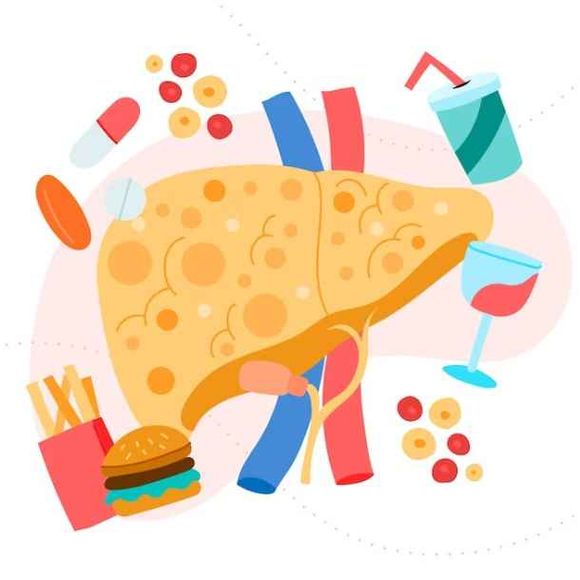
There are two types of fatty liver disease: alcoholic and non-alcoholic. Alcoholic fatty liver disease is caused by chronic and excessive alcohol use. Nonalcoholic liver disease (NAFLD) is not related to alcohol use , and in the article we will mainly consider it.
Although researchers still can't confirm exactly what causes fat accumulation in the liver, this condition is more common in people who have:
- Obesity
- Type 2 diabetes
- High cholesterol
- High blood pressure
Natural remedies for fatty liver disease
If a form of nonalcoholic liver disease is diagnosed, keep in mind that not all diets and supplements are healthy for the liver. If this is your diagnosis, it's important to discuss any alternative treatments with your doctor before trying them.
Losing Extra Pounds
Guidelines in the 2018 American Association for the Study of Liver Disease (AASLD) guidelines identify weight loss as a critical part of improving the progression and symptoms of NAFLD. 1
The guide recommends that people living with obesity and NAFLD eliminate between 3 and 5 percent of their body weight to reduce fat accumulation in the liver. It also states that losing between 7 and 10 percent of body weight can improve other NAFLD symptoms, such as inflammation, fibrosis, and scarring.
The best way to lose weight and maintain your weight is with small steps and no extreme restrictions. Fasting and extreme diets are unsustainable solutions and can be even more harmful to your liver, kidneys, hormonal balance.
Try the Mediterranean diet
A 2017 study suggested that the Mediterranean diet may help reduce liver fat, even without weight loss. 2
The Mediterranean diet also helps with conditions often associated with fatty liver disease, including high cholesterol, high blood pressure, and type 2 diabetes. As you probably know, this eating plan focuses on a variety of plant-based foods and healthy fats. Here's what you can include in a Mediterranean diet:
- Fruits and vegetables - berries, apples, oranges, bananas, figs, melons, leafy vegetables, broccoli, peppers, sweet potatoes, carrots, cucumbers, eggplant, tomatoes;
- Legumes - beans, peas, lentils, chickpeas;
- Healthy fats - olive oil, nuts, seeds, avocados, olives;
- Fish and lean meat - fish is permissible for consumption twice a week. Eggs and poultry can be consumed every day in normal quantities, unless you have some intolerance or disease that requires a change in diet;
- Wholegrains - whole grain bread, brown rice, whole oatmeal, couscous, whole grain paste, quinoa and others.
Consume coffee
According to a 2016 study, coffee offers a number of protective benefits for the liver. In particular, it stimulates the production of liver enzymes that are thought to fight inflammation.
The same study reported that among people with nonalcoholic fatty liver disease, regular coffee consumption reduced overall liver damage. Two to three cups of coffee a day seems to be the amount that is perceived as optimal. Black coffee is the best option as it does not contain any added fat or sugar. 3
More physical activity
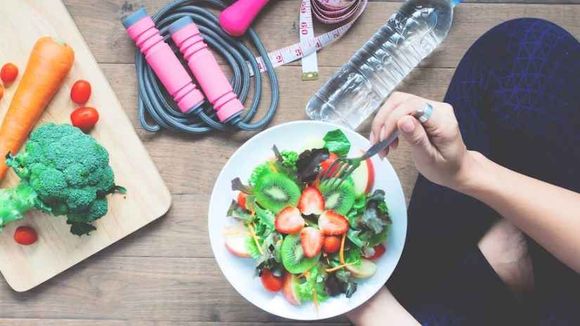
According to a 2017 study, nonalcoholic fatty liver disease is often associated with a sedentary lifestyle. In addition, lack of physical activity is known to contribute to other NAFLD-related conditions, including heart disease, type 2 diabetes, and obesity.
It is important to find time for sports not only to avoid these diseases. General guidelines are for at least 150 minutes of moderate-intensity exercise per week, divided into 3-4 workouts.
Avoid foods with added sugars
Dietary sugars such as fructose and sucrose have been linked to the development of nonalcoholic fatty liver disease. A 2017 study described how these sugars may contribute to the accumulation of fat in the liver over time. And what are these foods - we immediately give a list: 4
- Pasta products, such as cakes, biscuits, donuts, pastries and pies
- Candy
- Ice cream
- Sugar cereals
- Soft drinks
- Sports drinks
- Energy drinks
- Sweetened milk products
Correction of high cholesterol
According to research from 2012, 2014 and 2017, fatty liver disease can make it difficult for the body to control cholesterol. 5 This can worsen the condition of the liver and increase the risk of heart disease.
Try to limit your intake of certain types of fats to control your cholesterol. Fat restriction includes:
- Saturated fats. They are found in red meats and full-fat dairy products.
- Trans fats. Trans fats are often found in processed baked goods, crackers, and fried foods.
Taking a dietary supplement with Omega-3 fats
While apparently some fats should be limited, other types of fat can be beneficial. Omega-3 fatty acids are polyunsaturated fats found in foods such as oily fish and some nuts and seeds. They are known to have heart health benefits and are often recommended for people with non-alcoholic fatty liver disease.
A 2016 review of studies showed that taking an omega-3 supplement can reduce liver fat and improve cholesterol levels. 6
Avoid liver irritants
Some substances can strain the liver, including alcohol, medications, and certain vitamins and supplements. According to a 2019 study, even moderate alcohol consumption can lead to disease progression in people with NAFLD.
Intake of vitamin E
Vitamin E is an antioxidant that can reduce inflammation caused by nonalcoholic fatty liver disease. According to a 2018 review of scientific publications, more research is needed to understand who might benefit from this supplement and at what amounts. 7
Useful herbs for fatty liver disease
A 2018 review of studies identified certain herbs, supplements, and spices that have been used as alternative treatments for nonalcoholic fatty liver disease. Compounds that have been shown to have a positive effect on liver health include turmeric (Curcuma longa), milk thistle (Silybum marianum), resveratrol, and green tea. Before taking such herbs, consult a doctor, as some herbs can cause side effects.
